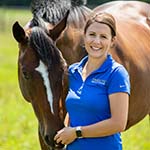Is My Horse Overweight?
Has your gelding ever been mistaken for a pregnant mare? If yes, you can feel some comfort in that you are not alone. In fact, one study found that over 51% of horses were overweight!
While common, equine obesity is a major issue, as it increases the risk of insulin resistance development, laminitis, and puts greater strain on the musculoskeletal system.
In some ways, it is more challenging to feed the very easy-keeper than it is to feed the hard-keeper. For the easy keeper, you need to balance strategies to maintain a healthy weight, while ensuring the horse still receives all of the required essential nutrients and enough fiber to keep the digestive system healthy.
Eliminate Extra Calories
The first step for the overweight horse is to cut extra calories coming from the concentrate portion of the diet. A ration balancer like Essential K® or Wholesome Blends™ Balancer are ideal for the easy-keeper. They are low in calories, with a very small feeding rate, but densely packed with the essential nutrients that are lacking in forage.
If changing from a higher volume feed to a ration balancer isn’t enough to shed those extra pounds, the next place we look at is the amount and type of forage the horse is consuming.
Analyze Amount & Type Of Forage Your Horse Consumes
This article discusses the basic differences between types of hay. Generally, we would avoid forages that are heavy in legumes for overweight horses because legume forages are more calorie dense. The best practice is to utilize forage testing services to identify hay that is less calorie dense, but still provides good quality fiber to the diet.
Avoiding Forages Heavy in Legumes
In addition to looking at the energy density of forage, we often also have to decrease the amount of forage the horse is eating. This is counter to our recommendations for most horses, which is to maximize the amount of forage in their diet. Yet, once you have reduced the calories from the concentrate portion of the diet by switching to a balancer and eliminating legumes, the only place left to cut calories is by addressing the amount of forage consumed.
The amount of forage reduction required is dependent on your individual horse’s specific situation. A rule of thumb to keep in mind is that the minimum amount of forage required to maintain a healthy digestive tract is 1% of the horse’s body weight on a dry matter basis. This means that if your horse is 1,000 lb, you need to provide 10 lb of hay per day on a dry matter basis. On average, hay is about 90% dry matter. Divide the pounds of hay on a dry matter basis by the percent dry matter to determine how many pounds of hay you need to feed on an as-fed basis (10 ÷ 0.9 = 11.1 lb hay as-fed). A simple way to think of as-fed is that this is what the hay will weigh if you were to weight it on a scale.
Not all horses will need to be fed the minimum amount of hay per day to lose weight. Hay should only be reduced to the extent needed to promote weight loss.
Manage Pasture Turnout
If your horse has access to grass, that is another area to address in a weight loss plan. There are benefits to pasture turnout, both for the mental health of the horse and also because it promotes more natural movement than a dry lot situation, but pasture access is often a source of significant calorie intake.
Limiting pasture turnout is an option that some turn to in order to decrease forage intake; however, research has shown that this approach doesn’t always work as intended. One study found that compared to full 24-hour turnout, rate of consumption increased as pasture access was limited. In fact, horses that were turned out for only three hours per day consumed 3-4 times as much grass per hour compared to the horses on full turnout. This means that in three hours, they ate the equivalent of ten hours of forage!
Grazing Muzzles for Maintaining Weight
Grazing muzzles can be a good compromise for the overweight horse to allow pasture access. They decrease the amount of grass the horse can eat, but the horse still gets the benefits of pasture time.
While this article was focused on the nutritional aspect of weight loss, the importance of a consistent exercise program can’t be understated.
If you need help in determining the best approach to help your equine partner reach a healthy Body Condition Score, please reach out to us for a personalized equine nutrition consultation!

